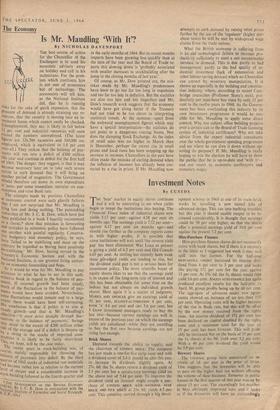The Economy
Is Mr. Maudling 'With It'?
By NICHOLAS DAVENPORT
THE best course of action for the Chancellor of the Exchequer is to send his economic advisers away on holiday and call in his technicians. For the prob- lem which confronts him is not one of economics but of technology. The economists will tell him, as the National Institute did, that he is running risks for the sake of quick expansion, that the pressure of demand is already straining our re- sources, that the country is moving into an in- vestment boom which cannot easily be checked. Unemployment, they say, is likely to fall below l per cent and industrial vacancies will soon exceed the numbers unemployed. (The latest figures are 326,500 vacancies and 369,000 un- employed, which is equivalent to 1.6 per cent over-all.) They reckon that the balance of pay- Ments will run into a deficit of £300 million this year and continue in deficit for the first half of 1965. The danger, they suggest, is that it may become necessary later on to take such severe action to curb demand that it will bring on another period of stagnation. The Government should therefore cut down its own expenditure at once, put some immediate restraint on con- sumption and raise Bank rate.
The attempts made by previous Chancellors at economic control were such ghastly failures that I am not surprised that Mr. Maudling is IYIng low and doing nothing. The painstaking researches of Mr. J. C. R. Dow, which have just been published in a book I heartily recommend as a classic,* show that mistakes in forecasting and mistakes in economic policy have followed °.ne another with painful regularity. Conserva- tive budgetary and monetary policy, he says, have 'failed to be Stabilising and must on the Contrary be regarded as having been positively de-stabilising.' Mr. Dow, having served in the Treasury's Economic Section and with the National Institute, is our greatest living author- IlY on economic forecasting and flops. So it would be wise for Mr. Maudling to pay attention to what he has to say in this auth- oritative book in regard to the balance of pay- Ments. If internal growth had been steady, much of the fluctuation in the balance of pay- ments would have been avoided. Nevertheless, some fluctuations would remain and to a large extent these would have been self-correcting. His conclusion is that if policy is to aim at steady growth-and that is Mr. Maudling's objective-'it must drive straight through fliic- il(attons in the balance of payments.' Swings may occur to the extent of £200 million either side of the average and if a deficit is thrown up by a swing in the stocks of imported corn-
luodities it is likely to be fairly short-lived. This, we hope, will be the case today.
The recent spurt in stock-building was, of course, mainly responsible for throwing the balance of payments into deficit. By the third quarter of 1963 stocks of industrial raw materials had become rather low in relation to the current level of output and a considerable increase in stockbuilding followed in the fourth quarter and ‘,Ttii, 1945.60- B ANAGEMENT OF THE BRITISH. ECONOMY Y J. C. R. Dow in conjunction with the National Institute of Economic and Social Research. 60s.)
in the early months of 1964. But in recent months imports have been growing less quickly than at the turn of the year and the Board of Trade re- ports this slowing down is 'probably associated with smaller increases in stockbuilding after the jump in the closing months of last year.'
Of course, as Mr. Dow pointed out, the mis- takes made by Mr. Maudling's predecessors have been to go too far too long in expansion and too far too late in deflation. But the statistics are also too late and too imperfect and Mr. Dow's research work suggests that the economy would have got along better if the Treasury had not tried to be too clever in interpreting statistical trends. At the moment-apart from the awkward unemployment figures- which may have a special interpretation-the statistics do not point to a dangerous roaring boom. Nor does the slumping Stock Exchange. As the index of retail sales was no higher in March than in December, perhaps the recent rise in retail prices and local rates has been mopping up the increase in incomes. Chancellors in the past have often made the mistake of cutting demand when the inflation of incomes has already been cor- rected by a rise in prices. If Mr. Maudling now
attempts to curb demand by raising retail prices further by the use of the 'regulator' (higher pur- chase taxes) he will be met by widespread wage claims from the trade unions.
What the British economy is suffering from is its old technological failure to increase pro- ductivity sufficiently to meet a not unreasonable increase in demand. This is due partly to bad management, partly to the bad quality of in- dustrial investment (lack of automation and other labour-saving devices) which no Chancellor can correct by monetary manipulation. It is shown up especially in the building and construc- tion industry, where, according to recent Cam- bridge researches (Professor Stone's unit), pro- ductivity per man-hour has risen by only 17 per cent in the twelve years to 1960. As the Govern- ment has been overloading this industry by its own investment programme it would be sen- sible for Mr. Maudling to apply some direct control. Why not subject office building projects over a certain size to the Board of Trade licensing system of industrial certificates? Why not take advice from the expert industrial consultants over the whole government spending programme and see where he can slow it down without up- setting its purpose? If Mr. Maudling is really hoping to w in the election he will have to show the public that he is up-to-date and 'with W- and not resort to economic soothsayers and monetary magic.






































 Previous page
Previous page